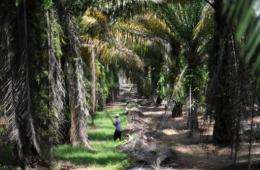Companies not buying enough 'green' palm oil: WWF

Major retailers and manufacturers are not doing enough to honour commitments to use sustainable palm oil to help protect virgin rainforests from destruction, WWF said on Tuesday.
The conservation group's latest report on palm oil use, released for this week's annual meeting of the Roundtable on Sustainable Palm Oil (RSPO), shows only half of palm oil used by surveyed companies came from sustainable sources.
The report said companies in Europe, Australia and Japan were buying more sustainable palm oil than ever before and noted that 87 of the 132 companies surveyed have pledged to use only eco-friendly oil by 2015.
But it said 17 of the 43 retailers and 15 out of the 89 manufacturers assessed scored poorly in the survey.
Palm plantations are considered one of the biggest threats to rainforests in countries like Malaysia and Indonesia -- the source of 85 percent of world palm oil supply -- as virgin forests are typically cleared to make way for them.

"It's never been easier for companies to be responsible about the palm oil they use," Adam Harrison, an agriculture policy specialist with WWF, said in a statement accompanying the Palm Oil Buyers Scorecard for 2011.
"So it is clear that some manufacturers and retailers have fallen behind on their commitments to 100 percent sustainable palm oil, while others haven't even started at all."
The scorecard focuses on major companies in Europe, Australia and Japan, the world's biggest palm oil markets.
About 5.2 million tonnes of certified sustainable palm oil was produced last year -- roughly 10 percent of world supply -- but only 56 percent was purchased, the WWF said.
Growers must meet numerous criteria like refraining from clearing virgin forests and adhering to fair land acquisition policies to gain the "sustainable" label.
But higher production costs, weak demand for eco-friendly palm oil, and other factors discourage farmers from going green, environmentalists say.
The WWF singled out major companies like Nestle, Unilever, IKEA, Cadbury and Carrefour for praise, saying they scored highly in the survey.
Palm oil represents about 35 percent of the global vegetable oil market but its production is expected to soar due to its versatility, relatively high oil yields, and economic importance to local communities.
Launched in 2004, the RSPO brought together producers, manufacturers and other stakeholders to create global standards for sustainable palm oil. Its meeting is being held this week in the Malaysian city of Kota Kinabalu.
(c) 2011 AFP



















